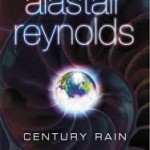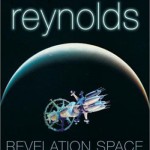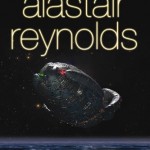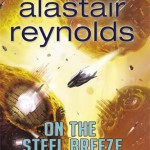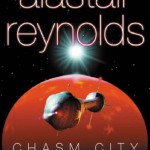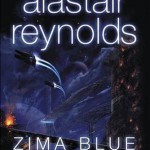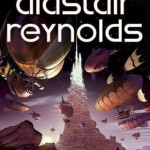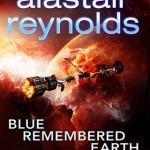I was born in Barry, South Wales in 1966.
Barry might not be everyone’s idea of the ideal place for a science fiction writer to be born, but I reckon it would be hard to beat. From my grandmother’s house we had a clear view of the Bristol Channel, with (well into the nineteen seventies) a seemingly endless stream of banana boats coming and going from the docks. Ships, the distant foghorn of the light vessel, the faint lights of towns along the coast of West Somerset and North Devon, the vast and rusting infrastructure of the docks…
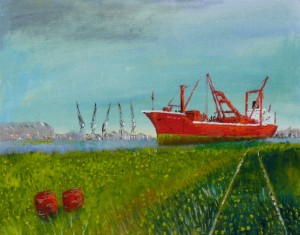
My father’s work as a civil engineer took us to Cornwall when I was small, where we lived in and around Truro. I had not returned to Truro since 1973, but in 2012 – nearly forty years later – I was surprised by how easily I was able to orientate myself in the town. Cornwall aside, I also have strong links to the West Country from my father’s side of the family. My sister was born in Cornwall so has even deeper claims to that part of the country.
We returned to Wales in 1973, and after a short period in Barry my family settled in and around Bridgend, where I was to remain until leaving home for university. My love for science fiction had already taken root by the time we left Cornwall. Other than the obvious televisual influences such as Star Trek, I was strongly impressed by the feature film version of HG Wells’ The Time Machine, as well as Fantastic Voyage, the Raquel Welch film about a miniaturised submarine being injected into a living person. Neither film has a particularly strong critical reputation, but they nonetheless had a huge impact on my developing imagination. I also developed an affection for the various Gerry Anderson series, although the most iconic one of all – Thunderbirds – did not seem to be aired in Cornwall. I only saw it when I was quite a bit older. I remember looking through copies of Radio Times, exasperated that Thunderbirds always seemed to be aired in a different region to the one I was living in. I suspect I wouldn’t have had anything like the same emotional connection to the series had it been easily available.
My involvement with written science fiction began in the mid 1970s. I had begun to read “Speed & Power” magazine, a short-lived publication aimed squarely at boys. Speed & Power was fantastically exciting to me, with its cutaways of helicopters and speed boats, and so forth. But the clincher was that each issue carried a piece of fiction – a complete story or installment in a larger work – by Arthur C Clarke. Lacking any context, I had no reason to assume that these stories were not being written for each issue. In fact they were – for the most part – already rather old. But I found them tremendously involving. One serial in particular – A Meeting with Medusa – had a profound effect on me. I can still remember reading it at the base of my grandmother’s long-case clock in Barry. Years later, I would collaborate with Stephen Baxter on the authorised sequel to that story.
Like many writers, I wasn’t a particularly healthy child. From the age of five I began to suffer from severe asthma, which had two effects. First of all, it made me profoundly uninterested in sports, and to this day I am not very coordinated when it comes to things like catching and throwing balls, telling left from right and so on. Secondly, it resulted in me spending a lot of time off school, of which quite a bit was spent in hospital, usually on a drip, often in an oxygen tent, with many long hours between visits. As is so often the case, this time alone made me bookish and fairly content with my own company. I often look back and wonder if I owe my writing to asthma – who can say? Forty years later, I still live with asthma on almost a daily basis (if I neglect to take my medication, I start feeling unwell within a week or so) but it’s been years since I had a really serious attack, and I think I know enough about the disease to be able to manage it comfortably. Put it another way, I live with it but I no longer feel limited or defined by it. In fact I took up running in my twenties, primarily as a way of giving asthma the two fingers, because – according to all the doctors I’d met up until that point – I should not be able to run. Other than the odd few weeks off due to chest infections or minor sports injuries, I have continued running ever since.
The morale of this is that all those people who said that my asthma would become more manageable as I got older were essentially correct, so take heart if you are a younger sufferer – there is every chance it will improve.
I was only good at two things at school – writing and drawing. (Three if you include making up excuses for why I could not do games). I could not be stopped making up stories. My teachers and family, though, all assumed that it would be the art that shaped my later life. I was expected to go into graphic design or something similar. In my mid-teens, though, I got it into my head that I would rather be a scientist. Although I had no natural aptitude for mathematics, I was fascinated by physics. It was an uphill struggle, but I eventually dragged my maths up the minimum necessary level to do degree physics. I studied astronomy and astrophysics at Newcastle and graduated in 1988.
By then my interest in science fiction writing had become serious enough that I was already submitting material to for publication. I had also written and finished two novels in my mid teens, of which I have more to say elsewhere, and a whole slew of unpublished (and mostly unpublishable) short stories. However, it never really occurred to me that the writing might one day be my actual career, as opposed to an interesting sideline. After all I had never met any professional writers, but at least I now moved in scientific circles and had some sense of what a scientific career path looked like.
I moved to Scotland after completing my degree, and spent three years gaining a doctorate in astronomy. I then moved to the Netherlands to take up my first real job, as a research fellow at the European Space Agency. ESA had a very egalitarian policy where the name on your door was simply your name, with no academic title allowed, which I liked enormously.
I spent three years as an ESA research fellow, then another two years as a post-doctoral researcher at Utrecht university, and then it was back to ESA for another stint, this one as a contract researcher. By the time I concluded my scientific career in 2004, I was four books into my new life as a novelist. My wife and I married the year after (we had known each other for more than a decade) and a year after that, we began to think about relocating to the UK, which is where we eventually moved in 2007. Allowing for trips back to sort out property, the Netherlands had been a part of my life for more than twenty years, and I am still very fond of the place. That said, Wales is such a wonderful part of the world that I doubt we would be happier anywhere else.
Writing remains both my vocation and my hobby, although there are certainly days when it feels more like a job than a past-time (deadlines will do that to you). During these times I remind myself that I’m only in this game because I loved science fiction too much, and what an extraordinary and lucky privilege it is to be able to make my living from what is, essentially, just making things up.
My reading of the form isn’t perhaps as avid as when I was a teenager, but then again I read more widely and indiscriminately now, which is useful if you are a writer, and I do still get a vivid kick from science fiction when I come at it anew. My theory is that the written form of the genre lights up a part of the brain that other variants rarely stimulate. It’s why prose science fiction still holds its own in the world of blockbuster films and computer games.
Beyond science fiction, I have a lifelong interest in wildlife, especially birds, bats and batachians. I am a continuing student of the guitar, both classical and electric, and can read music in a faltering fashion. I am now learning musical theory. I like painting, drawing and model-making. I have been a keen runner for more than thirty years and am evangelical about the benefits of running for health and mental well-being. I became aware of parkrun in 2018 and am now heavily involved in the volunteer side of it, as well as participating in the runs. I completed my fiftieth parkrun in 2019. I used to ride horses extensively and would like to get back in the saddle before long.
